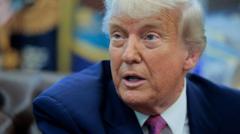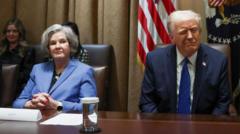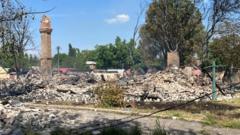**In a recent statement, President Trump warned that he would reassess his approach to Russia if relations did not show improvement within two weeks, as the conflict in Ukraine enters a new phase of violence.**
**Trump Sets Putin a Two-Week Deadline Amid Escalating Ukraine Conflict**

**Trump Sets Putin a Two-Week Deadline Amid Escalating Ukraine Conflict**
**New remarks by Trump raise questions about US-Russia relations as violence intensifies in Ukraine.**
In an unexpected turn of events, US President Donald Trump has reportedly given Russian President Vladimir Putin a two-week ultimatum regarding the ongoing conflict in Ukraine. During a briefing in the Oval Office, Trump stated that he would be able to determine if Putin was genuinely interested in halting the war or merely manipulating diplomatic negotiations within that time frame. The remarks come amidst a troubling escalation of Russian military actions, which have already led to significant civilian casualties in Ukraine.
Trump has increasingly criticized Putin, labeling his recent behaviors as "absolutely crazy" and describing the situation in Ukraine as "playing with fire." The US has witnessed some of the most extensive and deadly Russian bombardments since the beginning of the conflict, with Kyiv suffering significant casualties, including at least 13 deaths resulting from missile strikes over the weekend.
The former president's comments about an impending reassessment of his response to Russia highlight his increasing impatience and frustration with the lack of tangible results in ongoing discussions between the US, Ukraine, and Russia. A recent two-hour phone call between Trump and Putin ended with both leaders expressing a willingness to negotiate, yet a subsequent escalation of violence quickly undermined any hopes that a diplomatic resolution was imminent.
Despite Trump's strong words, there is skepticism regarding their impact on Moscow's conduct. Officials in the Kremlin seem unfazed, with an aide responding to Trump's remarks by suggesting that Trump may not have a clear understanding of the situation on the ground. The Kremlin has characterized Ukraine's military actions as those of a terrorist nature, further complicating the narrative surrounding the conflict.
The Biden administration continues to face challenges in navigating its approach towards both Ukraine and Russia. While sanctions against Moscow remain firmly in place, the strategy to mediate a peace agreement appears increasingly ineffective, with Russia emboldened rather than deterred. Trump has previously advocated for a swift ceasefire, but current demands have shifted towards arranging a summit with Putin, indicating a potential alteration in strategy.
As international dynamics shift, Germany, under its new Chancellor Friedrich Merz, has pledged to support Ukraine in producing long-range missiles to counter Russian aggression. However, Russia's warnings about the potential consequences of such military assistance highlight the delicate balance of power in the region.
As the fighting continues and thousands of lives are lost, the conflict remains at an impasse. Both Trump and Zelensky have accused each other of failing to deliver on promises to advance peace negotiations, with ongoing uncertainty regarding any viable path to resolution evident on both sides. The evolving situation prompts widespread concern about the enduring human and material costs of a war that has devastated large swathes of Ukraine.
Trump has increasingly criticized Putin, labeling his recent behaviors as "absolutely crazy" and describing the situation in Ukraine as "playing with fire." The US has witnessed some of the most extensive and deadly Russian bombardments since the beginning of the conflict, with Kyiv suffering significant casualties, including at least 13 deaths resulting from missile strikes over the weekend.
The former president's comments about an impending reassessment of his response to Russia highlight his increasing impatience and frustration with the lack of tangible results in ongoing discussions between the US, Ukraine, and Russia. A recent two-hour phone call between Trump and Putin ended with both leaders expressing a willingness to negotiate, yet a subsequent escalation of violence quickly undermined any hopes that a diplomatic resolution was imminent.
Despite Trump's strong words, there is skepticism regarding their impact on Moscow's conduct. Officials in the Kremlin seem unfazed, with an aide responding to Trump's remarks by suggesting that Trump may not have a clear understanding of the situation on the ground. The Kremlin has characterized Ukraine's military actions as those of a terrorist nature, further complicating the narrative surrounding the conflict.
The Biden administration continues to face challenges in navigating its approach towards both Ukraine and Russia. While sanctions against Moscow remain firmly in place, the strategy to mediate a peace agreement appears increasingly ineffective, with Russia emboldened rather than deterred. Trump has previously advocated for a swift ceasefire, but current demands have shifted towards arranging a summit with Putin, indicating a potential alteration in strategy.
As international dynamics shift, Germany, under its new Chancellor Friedrich Merz, has pledged to support Ukraine in producing long-range missiles to counter Russian aggression. However, Russia's warnings about the potential consequences of such military assistance highlight the delicate balance of power in the region.
As the fighting continues and thousands of lives are lost, the conflict remains at an impasse. Both Trump and Zelensky have accused each other of failing to deliver on promises to advance peace negotiations, with ongoing uncertainty regarding any viable path to resolution evident on both sides. The evolving situation prompts widespread concern about the enduring human and material costs of a war that has devastated large swathes of Ukraine.





















